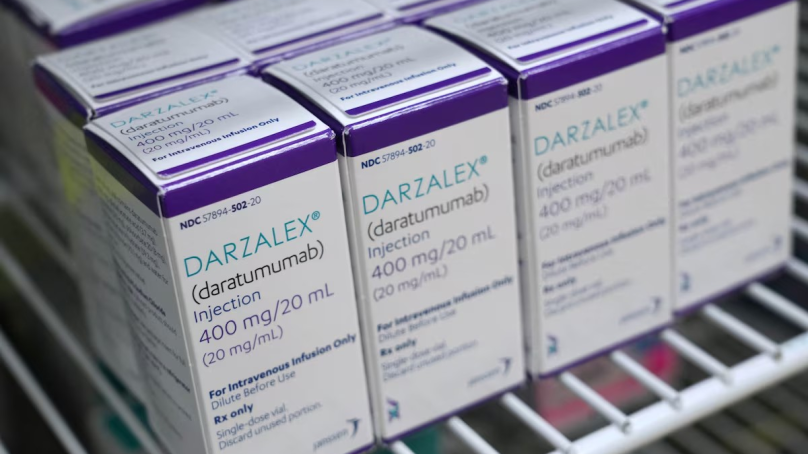
The Johnson & Johnson drug Darzalex showed promise in helping keep a precancerous condition from progressing to the blood cancer multiple myeloma for those at high risk, according to results from a trial presented at the American Society of Haematology meeting in San Diego.
the Technical University of Munich and Edinburgh University believe the technology will help provide faster and more accurate emergency care.
Darzalex, a monoclonal antibody that targets a protein found on the surface of myeloma cells known as CD38, significantly reduced patients’ risk of developing the blood cancer and improved their survival in an international late-stage trial.
“These results are a major advancement in the treatment of high-risk smouldering multiple myeloma,” study leader Dr S. Vincent Rajkumar of the Mayo Clinic Comprehensive Cancer Centre in Rochester, Minnesota said in a statement.
In smouldering multiple myeloma, abnormal plasma cells accumulate in the bone marrow. As the abnormal cells and certain proteins accumulate, a patient’s risk for cancer increases. In the trial of 390 patients with high-risk SMM, participants received either Darzalex, known chemically as daratumumab, or active monitoring.
After a median follow-up of 65.2 months, researchers saw a 51 per cent reduction in the risk of disease progression or death in patients receiving daratumumab, according to a report published in The New England Journal of Medicine.
At five years, 63 per cent of patients in the daratumumab group remained progression-free, compared to 41 per cent in the active monitoring group. Survival at five years was 93 per cent in the daratumumab group versus 87 per cent for monitoring.
“For the first time, we have a treatment option that can significantly delay or prevent the progression to active disease, improving the lives of patients and offering them a chance at a longer, healthier future,” Rajkumar said.
Boehringer Ingelheim and Eli Lilly’s oral diabetes drug Jardiance may keep diabetic eye disease from worsening in patients with type 2 diabetes, according to a report in JAMA Ophthalmology.
Researchers analysed US health insurance claims data on more than 80,000 patients with type 2 diabetes, including 7,831 closely-matched pairs with diabetic eye disease and another 34,239 pairs without the eye disease.
In each pair, one patient had received Jardiance, a pill from a class of drugs known as SGLT2 inhibitors, and the other received a DPP4 inhibitor such as Merck’s Januvia or Boehringer Ingelheim’s Tradjenta. On average, they were tracked for eight months after starting treatment.
The risk of developing a new case of diabetic eye disease was the same regardless of which drug patients were taking. But the risk that existing diabetic eye disease would worsen was 22 per cent lower in patients who started taking Jardiance, the researchers found.
The study was not a randomised trial and cannot prove that Jardiance actually slowed progression of the so-called diabetic retinopathy. Still, the authors concluded, “these findings may be helpful when weighing the risks and benefits of various glucose-lowering agents in adults with type 2 diabetes.”
A highly drug-resistant strain of cholera is now spreading over long distances, researchers warned in a letter to the editor of The New England Journal of Medicine.
From September 2018 to March 2019, a cholera outbreak with more than 10,000 suspected cases caused by a highly drug-resistant AFR13 7PET strain occurred in Zimbabwe. This strain had been introduced into East Africa from South Asia during 2013–2014.
By 2022, the AFR13 7PET strain was identified in cholera cases in southern and eastern Lebanon.
AFR13 7PET has probably contributed to a major cholera outbreak in Kenya between October 2022 and October 2023, with 12,120 cases, and to outbreaks in Tanzania and Comoros, where the number of cholera cases has been increasing since early 2024, researchers said.
In 2023, the highly drug-resistant strain was isolated from three European travellers returning from Kenya at different times of the year. In March 2024, it was isolated in Mayotte, a French island off the coast of southeastern Africa, initially from patients coming from Tanzania or Comoros and subsequently from patients infected locally.
From 2019 onward, isolates have been resistant to the antibiotics azithromycin, ciprofloxacin, and third-generation cephalosporins.
These data demonstrate the need to “strengthen global surveillance of the cholera agent, and especially to determine how it reacts to antibiotics in real time,” study leader Dr Francois-Xavier Weill of Institut Pasteur in Paris said in a statement.
“If the new strain that is currently circulating acquires additional resistance to tetracycline, this would compromise all possible oral antibiotic treatment.”
- A Reuters report







